International Week Against Unpaid Wages supported by unions in 14 countries
02/11/2020
During the third week of October (12th-18th) the first International Week Against Unpaid Wages took place. It was established by the International Workers’ Association (IWA/AIT) to highlight the phenomenon of unpaid wages and how we can fight it in the anarchosyndicalist manner. The IWA secretariat, Priama Akcia (PA) and other unions wrote their statements regarding the topic. Furthermore, unions of the IWA informed about the Week in the countries they are active and reminded their older or actual conflicts related to the issue. Here is the summary of all activities from 14 countries and our evaluation of the Week.
POLAND
Związek Syndykalistów Polski (ZSP, Union of Syndicalists of Poland) is one of the IWA unions with a long list of conflicts for payment of owed wages. On the occasion of the Week the ZSP prepared an extensive and valuable material in English about the issue of unpaid wages and concrete struggles for winning them back which can be downloaded here: https://iwa-ait.org/content/zsp-fighting-back-international-week-action-against-unpaid-wages. The union participated by doing other activities as well.

On Sunday 11th October two live streams were broadcasted about the issue. One in English and one in Polish. The following topics were discussed: the IWA, various forms of non-payment of wages, concrete conflicts of the IWA unions, the importance of fighting back even in cases where small amounts of money is owed etc. ZSP member also mentioned that the union planned to join the Week by organizing direct actions for unpaid wages, but they won two conflicts the week before and another was about start a bit later (and it eventually did, on 26th October in form of a protest against unpaid wages and holidays in front of the Center for Education, Therapy and Diagnosis TuMiRaj in Warsaw).
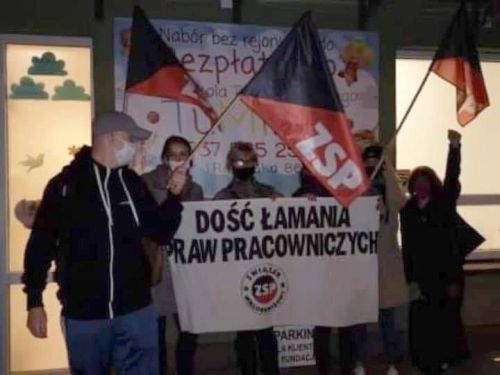
Another action took place on 15th October in Warsaw. It was a protest in front of National Labour Inspectorate (PIP) against inaction and inability of this institution to fight problems on the labour market, mainly the unpaid wages.
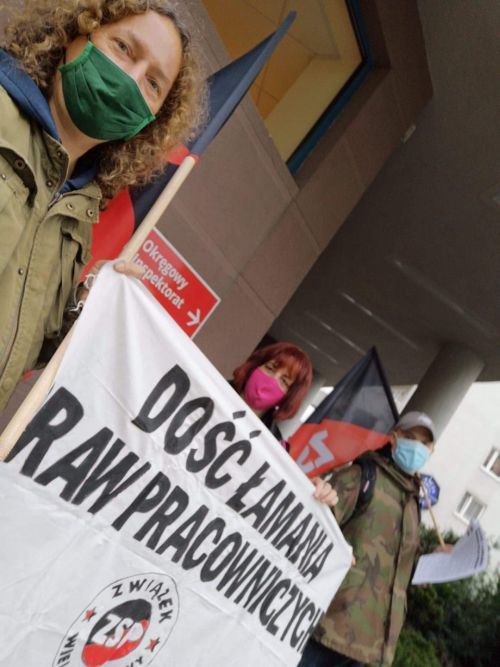
Protest was organized also in Lodz, on 17th October (https://www.facebook.com/events/1448607108657015/) in front of local offices of ruling party PiS. In their speech the union mentioned that according to PIP data for 2019 the employers owed workers 102 million zloty (cca 22 million €) in unpaid wages and bonuses. It is expected that the data for 2020 will be even worse due to the effects of pandemic. ZSP refused the notion that the employers don’t have the money and condemned their withholding on company accounts.
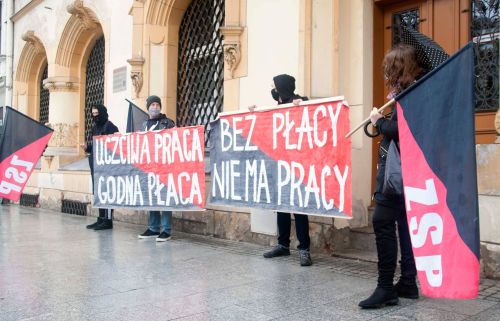
The union in Wroclaw set up a FB event between 14th-18th October, where people could write about their problems with unpaid wages, unpaid work after working hours or shortening of breaks. Also, people who won their owed wages could tell their stories.
SPAIN
Confederación Nacional del Trabajo (CNT-AIT, National Confederation of Labour) made actions in several Spanish towns.
On 15th October a picket took place against unpaid wages in La Boheme café in Albacete. Two days later the union organized a discussion about its experiences with struggles against unpaid wages. They talked about conflicts with some of the main hotel establishments and companies in the city, where direct action was the key factor that forced these companies to pay what they owed to comrades.
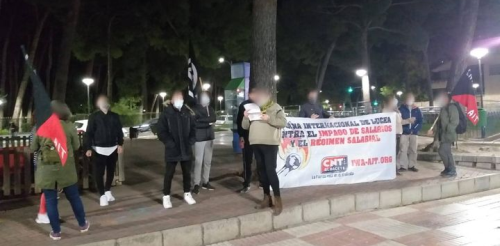
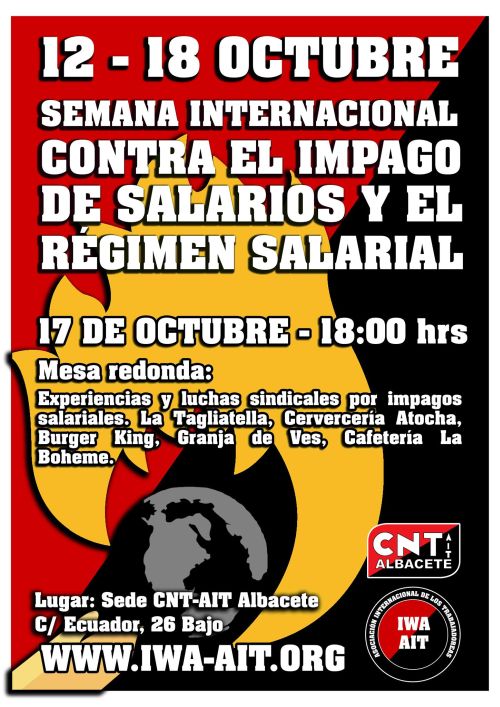
In Granada, the union organized a “mobile” picket on 16th October. They moved through the town and visited companies they currently have conflicts with. Stops were made in front of MIMIMI café, Joyerías Sánchez jewelry and finally a solidarity picket was organized in front of CeX, with which the union in Barcelona is in conflict. They also called people to contact the union in case of any workplace problems, so that they can fight them together.
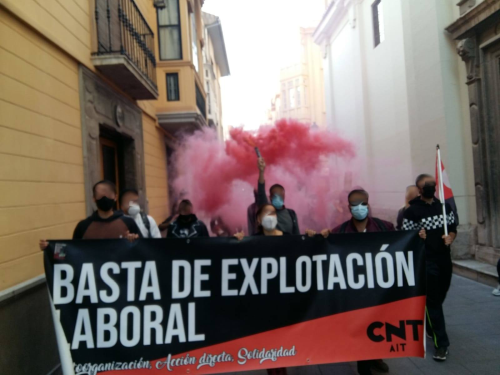
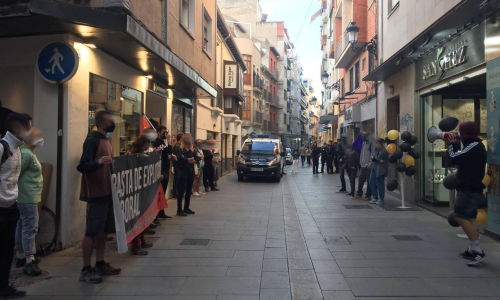
On 17th October, union in Tarragona organized protest actions to point out at two companies that owe wages to comrades.
Similar mobile action as in Granada took place also in Barcelona on 17th October. Companies that owe wages and don’t follow collective agreements (which is also the reason for the current conflict with company CeX) were targeted.
Other CNT-AIT unions informed about the Week on their social networks.
AUSTRIA
Very practical was the involvement of Wiener ArbeiterInnen-Syndikat (WAS, Vienna Workers Syndicate) in the Week – the union started a conflict with Seamox GmbH and organized a picket in front of their headquarters in Vienna on 15th October demanding payment of 5 800 € in owed wages to ex-worker.
Protest against Seamox was livened up by banners, speeches, music and chanting. The boss became paranoid and instead of meeting the protesters, he called the police, which had no effect on the protest.
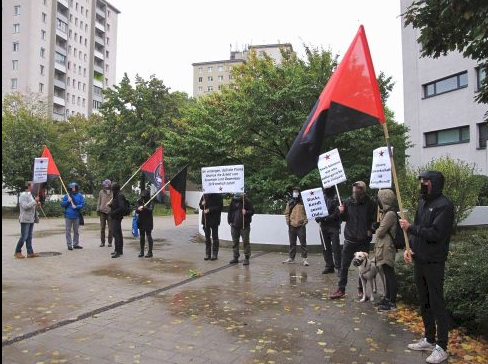
Seamox is actually only one of four subcontractors involved in providing job for the IT technician (who, by accident, is a comrade from CNT-AIT union in Spain who worked in Vienna in November and December 2019). According to WAS the whole issue seems like a business model that servers to bypass the social security and paying of taxes.
“If our comrade from Spain does not get his wages and proper registration in relation to the social security is not done in upcoming days, another protest will be held against next subcontractor in line.”
WAS is our sister organization with status Friends of the IWA and already won three conflicts this year, about which they informed on their website wiensyndikat.wordpress.com.
SLOVAKIA
We, as Priama akcia (PA, Direct Action), participated in various ways. Our aim was to show, that when people show interest and act, it is really possible to fight unpaid wages.

We started to promote the Week already in September by sharing the video prepared by the IWA secretariat:
At the beginning of October we published our statement regarding the topic and called on people to share their experiences and give us tips on companies that don’t pay wages. For this purpose we also created a FB event, where we posted all the necessary information, activities and experiences.
We reminded ourselves to some of the companies we had conflict with in the past using stickers. Based on tips from people we also put stickers around a few other businesses in Bratislava and Senec, and upon request sent stickers to people outside Bratislava region.
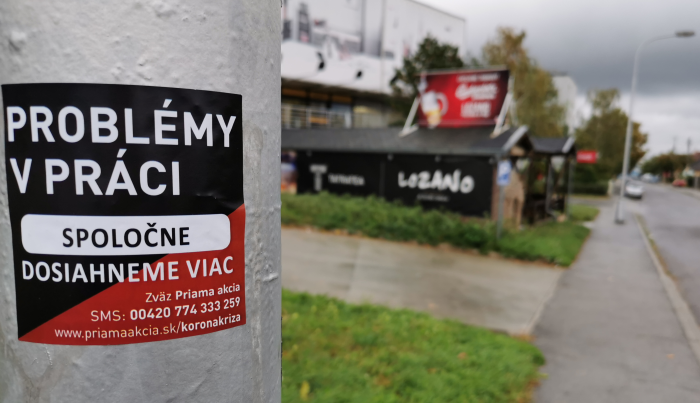
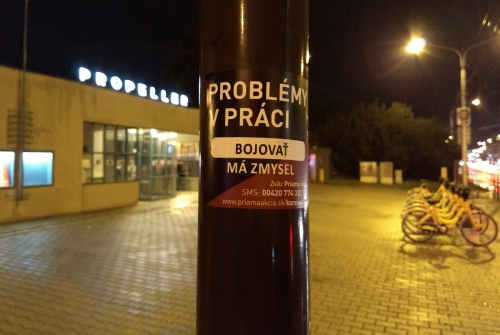
During the week we published on a daily basis at least one case of successful struggle for owed wages in Slovakia or abroad (focusing mostly on struggles of the IWA unions). Four of them were accompanied by videos:
PA conflict with CATO Agency
ZSP conflict with Impuls agency
SolFed conflict with a café in Brighton
Conflict of Solidarity Network from Most with Zepter International
Also, we mentioned our publication that was printed this year „Ako sme si poradili s problémami v práci: Spory zväzu Priama akcia v rokoch 2015-2019“ (How we handled problems at work: Conflicts of Priama Akcia union in 2015-2019). Most of the conflicts were related to unpaid wages and we describe in detail actually how a conflict for workers’ demands begins and develops and what is necessary to win. We compared some of the conflicts (three were from hospitality sector) and took into account their weaknesses and strengths. This and other our publications about solving workplace related problems can we found at nbz.priamaakcia.sk.
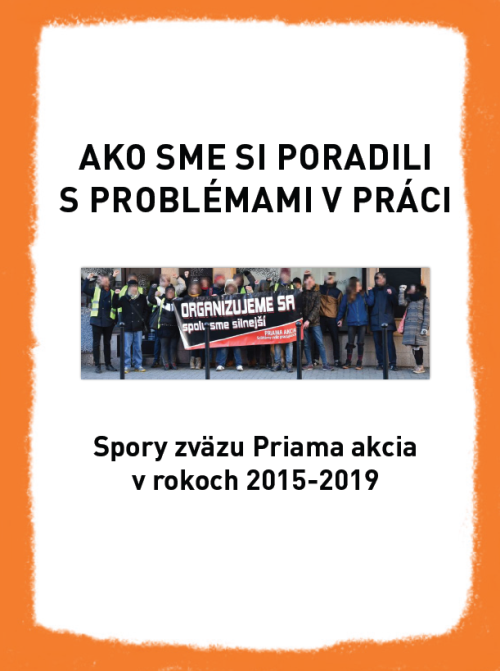
We also reprinted our text on unpaid wages from last year that deals with common problems related to contracts, pay slips, obstacles on the part of employer and signing of documents forced by the bosses.
UK
Solidarity Federation (SolFed) has lots of experience fighting the unpaid wages. Union in Bristol prepared a statement summarizing facts about the phenomenon in the UK. Here is an excerpt:
“In 2018, the BBC reported that non-payment of even the national minimum wage was at a record high, with an estimated £15.6 million going unpaid to workers who were being paid below the already pitiful minimum wage. Social care, warehouse work and the so-called ‘gig economy’ were the worst affected sectors. It’s worth remembering that the UK minimum wage is already too low to be able to live on, even without wage theft; the same year, the Child Poverty Action Network reported that a single parent earning the national minimum wage would be an estimated £74 per week short of the minimum income needed to meet basic needs.
Bosses have other tactics for stealing our pay. Wage theft tends to be “little and often” i.e. small amounts taken regularly, so the worker is impacted but doesn’t feel able to speak out. Other common forms of wage theft include non-payment for trial shifts, unpaid holiday entitlement and not paying workers for their last shift. Workers under 25 and workers over 64 are the most likely to be affected. The worst sector for wage theft overall is the hospitality sector, including pubs, restaurants and hotels. Even in more lucrative industries like the media and creative arts, wage theft is common. Many workers reported being pressured to work above their contracted hours for no additional pay.”
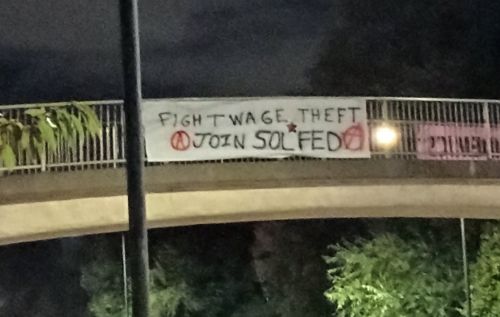
SolFed promoted statements of the IWA secretariat and PA, a member of Leeds union helped with graphics and, on 12th October, the union in Liverpool started an online public reading group focused on researching workplace struggles with the first session dedicated mostly to struggles against unpaid wages.
NORWAY
Norsk Syndikalistisk Forbund (NSF, Norwegian Syndicalist Federation) translated statements of PA and IWA secretariat into Norwegian and spread them on their website www.nsf-iaa.org and via e-mail. They also informed about two conflicts related to unpaid wages.
In the first case, NSF was contacted by a worker regarding unpaid wage. ZSP union showed support as well and sent a fax to the company stating that they will follow the case. This along with leaflets spread by NSF was enough to get the money back.
In another case, a member of NSF was not paid.
“Victories over unpaid wages disputes can be achieved without going public. A member of NSF who worked in an international fastfood chain didn’t get her wages. We discussed the matter and it only took a weekend and the wages were paid,” NSF explain their successful tactics.
NSF added that information about the Week were well-spread and well-received by people.
RUSSIA
Konfederacija revoljucionnych anarchosindikalistov (KRAS, Confederation of Revolutionary Anarchosyndicalists) informed us about the situation in the country, which makes it impossible to organize any protest activities. We quote:
“The totalitarian measures of de facto house arrest and terror with the help of fines, introduced by the Russian authorities this spring under the pretext of an epidemic, effectively deprived us of the opportunity to work outside the Internet. Even before that, it was very difficult to hold public events in Moscow.”
Street protest with more than one person requires official permission. The last time KRAS tried to organize a protest in solidarity with workers with owed wages they were twice refused and any street actions in Moscow are prohibited and repressed now.
“In this situation, we are forced to confine ourselves to online propaganda activity, through our website and social networks. We continue to disseminate information about the strike movement in Russia and Ukraine (including strikes for the payment of wage arrears, which is now the main cause of strikes), about social protests in the world and the struggle of our comrades from other sections of the International Workers’ Association. We are also actively campaigning against the totalitarian measures to trample on freedom, which are established by the authorities under the pretext of fighting the epidemic,” comments KRAS.
We have to confirm that the website of KRAS is truly unique in the amount of published news about workers’ movement in Russia and in the world. We recommend to read it with an online translator tool.
SWEDEN
Örestad LS (ÖLS, Örestad Local Group) informed about specific situation in Sweden. The union was able to succeed in all the cases of owed wages.
“So far we have never had to use demonstrations, pickets or other forms of direct action to get the companies to pay. They have paid when we have demanded it,” explain ÖLS.
Furthermore, a state enforcement agency operates in the country that can be used to get owed wages. The union sometimes advises non-members to use it and those who did, always got their money back. However:
“This does not mean that it is not a problem in Sweden. It is! Particularly in the gig economy and among people working without papers. And ÖLS has been active together with other groups in organising and maintaining boycotts concerning pubs and restaurants that have used ‘slave labourers’. The latest boycott was this spring and was successful,” continue ÖLS.
ÖLS took part in the Week mainly by promoting it on their website http://orestadls.wordpress.com and social networks. We were happy to hear from ÖLS that the activities of the IWA around the Week were very inspiring and they plan to take steps in further developing the union.
USA
Workers` Solidarity Alliance (WSA) is another organization with Friends of the IWA status. They informed about the Week on their social networks. In their statement they also pointed out to problems that are rather specific in the USA - unpaid tips and prison system with cheap if not slave labour (in recent years several strikes were organized in US prisons which the WSA supported).
AUSTRALIA
Anarchosyndicalist Federation (ASF) promoted the Week via their social networks and invited people to watch the live stream about the topic which was organized by the ZSP union from Poland.
SERBIA
Anarhosindikalistička inicijativa (ASI, Anarchosyndicalist Initiative) promoted the Week by spreading the statement of the IWA secretariat in Serbian language on their social networks.
BULGARIA
Avtonomna Rabotničeska Konfederacija (ARK, Autonomous Workers Confederation) is not part of the IWA, but translated and promoted the statement of the IWA secretariat in Bulgarian language.
CZECHIA
Pražská solidární síť (Solis, Prague Solidarity Network) is also not part of the IWA, but it maintains comradely relations with our union and published our statement on their Facebook page.
GERMANY
Anarcho-Syndikalistisches Netzwerk (ASN, Anarchosyndicalist Network) from Koln is close to IWA and during the Week they spread posters in the streets calling people to fight for owed wages and contact ASN because it is easier to fight together. 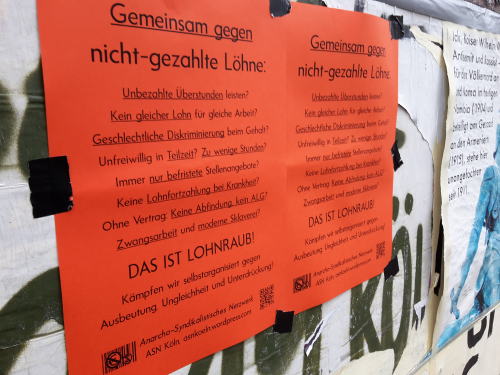
Our evaluation of the first International Week Against Unpaid Wages
First of all a little bit of history. The idea to establish the Week came from PA last year (initially, we thought about a Day, not a Week). We elaborated our idea, presented it to the rest of the IWA unions and at the IWA Congress in Melbourne in December 2019 it was approved with amendment to make it a Week. Then we tried to make it as easiest as possible for all the unions to join the Week and helped also with the preparation of the IWA secretariat statement.
In one way or another 11 out of 18 currently existing organizations of the IWA took part in the Week. We have to keep in mind that some organizations have extremely difficult conditions for making activities and their members are in an unenviable existential situation due to the pandemic and state repression (mainly in Asia and Pacific).
We are happy about exchange of experiences with struggles that took place between the unions as well as sharing of information on the topic of unpaid wages in the countries they operate. Also, we had a good response on Facebook where people mentioned their experiences with unpaid wages.
All in all, we are satisfied with how the first International Week Against Unpaid Wages went on. We will evaluate it also on the level of IWA at its plenary meeting in summer 2021. Our main aim will be to contribute to making the struggles of the IWA unions against unpaid wages more effective and discuss possible activities during the next years’ third week of October.
Priama Akcia union
Slovak section of the IWA/AIT